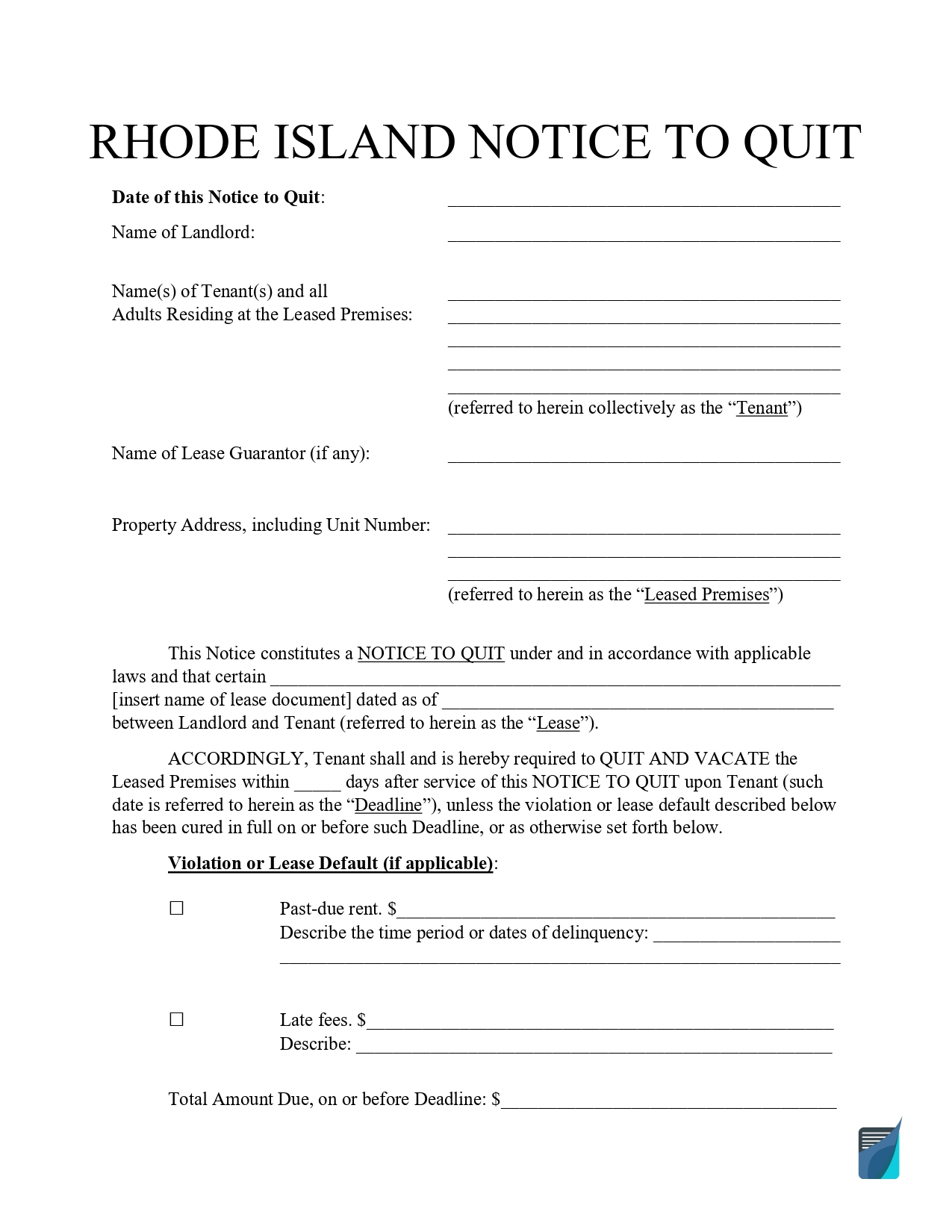Rhode Island Eviction Notice Forms
The Rhode Island eviction notice is a document used by landlords when they need to communicate to a tenant that they must vacate the premises. This form is typically the first step in the legal process of eviction and must adhere to the specific legal standards set by Rhode Island law. It’s important that the form clearly states the reason for removal, which can range from non-payment of rent to violation of lease terms or other serious breaches.
When issuing eviction notice forms in Rhode Island, landlords must provide tenants with a suitable notice period to rectify the issue or leave the property. The duration of this notice varies based on the infraction, but it must always comply with state regulations to ensure the process is lawful. For example, non-payment of rent usually requires a shorter notice period than other breaches of the lease agreement.

Build Your Document
Answer a few simple questions to make your document in minutes
Save and Print
Save progress and finish on any device, download and print anytime
Sign and Use
Your valid, lawyer-approved document is ready
Rhode Island Eviction Laws
In Rhode Island, if a tenant falls behind on rent for more than fifteen days, the landlord is mandated by Section 34-18-35 of the Rhode Island General Laws to issue a written notice. This notice must specify the overdue rent amount, demand payment, and inform the tenant of the lease’s potential termination if the issue isn’t resolved within five days following the notice’s issuance. Failure to comply within this timeframe allows the landlord to initiate an eviction lawsuit. The eviction notice must include:
- A detailed account of the overdue rent.
- A clear demand for the unpaid rent.
- A deadline by which the rent must be paid to avoid eviction.
Post the notice period, if the tenant remains non-compliant, the landlord is legally entitled to file an eviction action, which must not commence before the sixth day after the notice has been served.
Moreover, Section 34-18-36 addresses evictions due to noncompliance with rental agreement terms unrelated to rent payments. If a tenant violates other terms of the lease (especially those materially affecting health and safety), the landlord must issue a notice giving the tenant 20 days to correct the issue.
Rhode Island law also offers the opportunity to settle the full amount due before the commencement of the eviction suit. This is especially important if the tenant has not received a similar notice in the past six months, as they retain the right to pay the overdue rent along with any associated court costs at the hearing.
Rhode Island Eviction Notice Laws Details
| Rent Grace Period | Not Mentioned |
| Notice of Non-Payment | 5 days |
| Notice of Non-Compliance | 20 days |
| State Laws | Rhode Island General Laws, Sections 34-18-1 to 34-18-57 |
Eviction Notice Types Used in Rhode Island
Different types of notices are used depending on the reason for eviction. Each type is regulated by specific sections of the Rhode Island General Laws.
Nonpayment of Rent
Landlords are required to issue a five-day notice to tenants who are over fifteen days late on their rent as per Section 34-18-35. This notice must outline the amount of rent overdue and inform the tenant that the rental agreement will terminate if the payment is not made within the specified period. Failure by the tenant to remedy the nonpayment allows the landlord to initiate formal eviction proceedings.
Noncompliance with Rental Agreement
When a tenant violates terms of the rental agreement not related to rent payment, such as conditions materially affecting health and safety, the landlord must issue a twenty-day notice as stipulated in Section 34-18-36. This notice should clearly describe the breach, specify the corrective actions needed, and warn that the rental agreement will end if the breach is not rectified within the allotted time.
Termination of Periodic Tenancy
For terminating a month-to-month tenancy or any periodic tenancy lasting more than a month but less than a year, either party may end the agreement with a thirty-day notice, guided by Section 34-18-37. The notice must be delivered following the form specified in Section 34-18-56(c) and served at least thirty days before the intended termination date.

Eviction Process in Rhode Island
Rhode Island’s eviction process is structured to respect both parties’ rights while ensuring legal enforcement of leases.
Issuance of the Appropriate Notice
Depending on the reason for eviction, the first step is for the landlord to issue a legally compliant notice to the tenant. For nonpayment of rent, a five-day notice is required after the rent is 15 days overdue. For breaches other than nonpayment, a twenty-day notice is needed. Each notice must specify the breach, the actions required to remedy it, and the consequences if the breach is not resolved.
Waiting Period for Tenant Compliance
After the notice is served, the tenant has a specific period to remedy the situation. For nonpayment, the tenant has five days to pay the overdue rent. The tenant typically has twenty days to correct the issue for other breaches.
Filing of Eviction Complaint
If the tenant fails to remedy the breach within the specified period, the landlord may proceed to the next step: filing an eviction complaint. The complaint must be filed in the appropriate district court or housing court.
The landlord would file a Form DC-54 for nonpayment of rent. If the removal is for reasons other than nonpayment, the Form DC-38 is used. Upon receiving the eviction complaint, tenants are required to complete Form DC-53 (Answer Defendant-Tenant).
Court Summons and Hearing
Upon filing the complaint, the court issues a summons to the tenant. The summons includes the date and time for the hearing and informs the tenant of their right to file an answer to the complaint and participate in the hearing. If the tenant fails to appear or respond, they may be defaulted, which typically favors the landlord’s case.
Court Decision and Potential Eviction
Both parties have the opportunity to present their cases at the hearing. The court will consider all evidence, including compliance with notice requirements and the tenant’s efforts to remedy the breach. If the court rules in favor of the landlord, it will issue an order for the tenant’s eviction.
The tenant may be given a final date by which they must vacate the premises. If the eviction is for nonpayment and is found to be willful, the court may also award reasonable attorney’s fees to the landlord.

Use our document builder to customize any template on FormsPal to your preferences. Here is a number of some other widely-used Rhode Island forms we provide.
Other Eviction Notice Forms by State